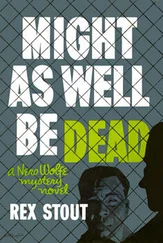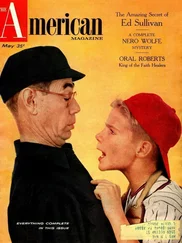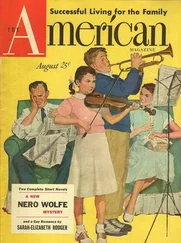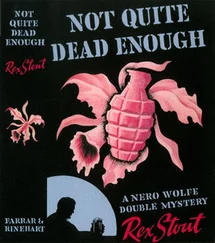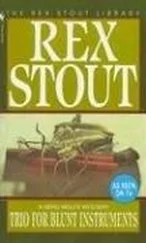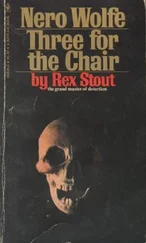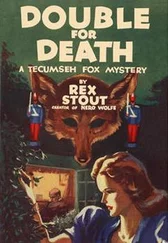Rex Stout - Three Doors to Death (The Rex Stout Library)
Здесь есть возможность читать онлайн «Rex Stout - Three Doors to Death (The Rex Stout Library)» весь текст электронной книги совершенно бесплатно (целиком полную версию без сокращений). В некоторых случаях можно слушать аудио, скачать через торрент в формате fb2 и присутствует краткое содержание. Жанр: Старинная литература, en-GB. Описание произведения, (предисловие) а так же отзывы посетителей доступны на портале библиотеки ЛибКат.
- Название:Three Doors to Death (The Rex Stout Library)
- Автор:
- Жанр:
- Год:неизвестен
- ISBN:нет данных
- Рейтинг книги:3 / 5. Голосов: 1
-
Избранное:Добавить в избранное
- Отзывы:
-
Ваша оценка:
- 60
- 1
- 2
- 3
- 4
- 5
Three Doors to Death (The Rex Stout Library): краткое содержание, описание и аннотация
Предлагаем к чтению аннотацию, описание, краткое содержание или предисловие (зависит от того, что написал сам автор книги «Three Doors to Death (The Rex Stout Library)»). Если вы не нашли необходимую информацию о книге — напишите в комментариях, мы постараемся отыскать её.
Three Doors to Death (The Rex Stout Library) — читать онлайн бесплатно полную книгу (весь текст) целиком
Ниже представлен текст книги, разбитый по страницам. Система сохранения места последней прочитанной страницы, позволяет с удобством читать онлайн бесплатно книгу «Three Doors to Death (The Rex Stout Library)», без необходимости каждый раз заново искать на чём Вы остановились. Поставьте закладку, и сможете в любой момент перейти на страницу, на которой закончили чтение.
Интервал:
Закладка:
Rex Stout
Three Doors To Death
Introduction
Let's face it.
We can stare at each other over designer coffee and natter on about the spiritual and intellectual benefits of immersing oneself in haute litterature , but most of us read fiction to get away from the drudgery of our lives.
And what a wonderful sanctuary Rex Stout has provided millions of readers for over half a century by introducing the world to Nero Wolfe.
As the century fades, Wolfe lives on, fresh and current as ever. One reason is the way he lives – a self-contained, blatantly self-indulgent existence in a Manhattan brownstone on West Thirty-fifth Street surrounded by gleaming paneling, fine furniture, gourmet food, servants, exotic orchids, the power to control life's nasty little intrusions. What a glorious end-of-day tonic for clock watchers, straphangers, and freeway slaves. How many of us wouldn't commit minor mayhem in exchange for an Archie Goodwin to cheerfully run our errands and tidy up our scutwork, or a Fritz Brenner to prepare and serve our sweetbreads en croute on bone china? With a suitable wine. (Interestingly, Wolfe's cozy world also burlesques the isolated, self-indulgent life of the writer and, in that sense, can be regarded as Stout's wicked slant on the artiste . )
Stout had wicked slants on lots of things and a gift for phrasing and rhythm and irony that remains remarkably contemporary. Consider lines such as these: "Her chin hinges began to give"; "the sort of greasy voice that makes me want to take up strangling"; "he was slender, elegant, and groomed to a queen's taste, if you let him pick the queen." And let us not forget the hilariously truistic: "Escorting a murderer on a subway without handcuffs is a damn nuisance, so I chose a taxi."
Stout's sense of humor is at its best when it conveys a lusty misanthropy. Wolfe's truculent view of his fellow men – and women – is delicious in an age when sectarian selfishness and emotional lobotomy masquerade as political correctness and the carny freak parade is beamed into our homes daily in the form of pretentiously mislabeled talk shows so self-righteously smarmy they gag the consciousness. Take a blissful moment to imagine Wolfe on Geraldo or Oprah or any of the other high-octane patholothons. I, for one, would commit major mayhem for the privilege of witnessing it. Hell, one good "Pfui!" directed at a celibopsychic schizoid diaper devotee would be worth it.
Then there's Wolfe's glorious gluttony, a perfect foil for the skeletal images and anorexic fiction promulgated with teeth-gnashing joy by the style-over-substance crowd. Stout doesn't spare Wolfe the consequences of his hyperphagia – the Great Man is so monstrously endomorphic that when he removes his pajama top, he reveals "enough hide to make shoes for four platoons;" but he does not assault us with cholesterol counts and dire warnings of vascular sludge. During the time we spend gourmandizing along with Wolfe, the nagging and finger-wagging of gram-counting aerobicops fade mercifully into the background. Wolfe may huff and puff during his infrequent outings into the "real" world – the description of his unplanned hike in the final story in this volume is as memorable as anything that has ever been put to paper – but he is happy with himself. And when we are with him, so are we, by God.
Of course there's more to Wolfe than constructive agoraphobia or cream sauce. Stout's stories are always great mysteries – whodunits, howdunits, whydunits – and they zip along at a pace that would leave the Great Man anoxic.
Some say Stout's talents were put to best use in the novella, and no contradiction of that judgment can be found in the three stories in this book.
Turn the page, then, and prepare yourself for a well-deserved getaway: the funny, phony, bloody world of high fashion as portrayed in "Man Alive." The knife-in-the-back shenanigans of the nascent fast-food industry in "Omit Flowers" (how sadly civilized that bit of vulgarity seems compared to today's technoburger madness). And finally, the spooky and downright nasty family psychopathology of "Door to Death," a real chiller.
Three gems.
Three great escapes.
–Jonathan Kellerman
Foreword
Looking over the scripts of these accounts of three of Nero Wolfe's cases, it struck me that they might give a stranger a wrong impression of him, so I thought it wouldn't hurt to put in this foreword for those who haven't met him before. In only one of these cases did he get pai d – I mean paid money – for working on it, and that might give someone a woolly idea which could develop into a nuisance. I want to make it clear that Wolfe does not solve murders just for the hell of it. He does it to make a living, which includes me, since he can't live the way he likes to without signing my pay check each and every Friday afternoon. Also please note that in the other two cases he did get something: in one, the satisfaction of doing a favor for an old and dear friend, and in the other, a fill-in for Theodore.
With that warning, I like the idea of putting these three cases together because they make a kind of complicated pattern of pairs. In two of them Wolfe got no fee. In two of them he had to forget a document to get a crack started. In two of them the homicide was strictly a family affair. In two of them I became acquainted with a young female, not the same one, who quite so close to a murder. So I think they'll be a little more interesting, in a bunch like this, provided they don't start people phoning in to ask me to ask Wolfe to solve murders as a gift. I'm just telling you.
Archie Goodwin
Man Alive
I
She said, in her nicely managed voice that was a pleasure to listen to, "Daumery and Nieder."
I asked her politely, "Will you spell it, please?"
I meant the Daumery, since I already had the Nieder down in my notebook, her name being, so she had said, Cynthia Nieder.
Her lovely bright blue eyes changed expression to show that she suspected me of kidding her – as if I had asked her to spell Shakespeare or Charlie Chaplin. But I was so obviously innocent that the eyes changed again and she smiled.
She spelled Daumery and added, "Four ninety-six Seventh Avenue. That's what we get for being so cocky about how famous we are – we get asked how to spell it. What if someone asked you how to spell Nero Wolfe?"
"Try it," I suggested, smiling back at her. I extended a hand. "Put your fingers on my pulse and ask me. But don't ask me how to spell Archie Goodwin, which is me. That would hurt."
Wolfe grunted peevishly and readjusted a few hundred of his pounds in his built-to-order high-test chair behind his desk. "You made," he told our visitor, "an appointment to see me. I supposed you needed a detective. If so tell me what for, without encouraging Mr. Goodwin to start caterwauling. It takes very little to set him off."
I let it go by, though I am much more particular than his insult implied. I felt like indulging him because he had just bought a new Cadillac sedan, which meant that I, Archie Goodwin, had a new car, because, of the four men who lived in Nero Wolfe's brownstone house on West 35th Street not far from the river, I was the only one who drove. Wolfe himself, who suspected all machinery with moving parts of being in a plot to get him, rarely left the house for any reason whatever, and never – well, hardly ever – on business. He stayed in his office, on the ground floor of the house, and used his brain if and when I could pester him into it. Fritz Brenner, chef and supervisor of household comforts, knew how to drive but pretended he didn't, and had no license. Theodore Horstmann, curator of the orchids in the plant rooms on the roof, thought walking was good for people and was still, at his age, trying to prove it.
Читать дальшеИнтервал:
Закладка:
Похожие книги на «Three Doors to Death (The Rex Stout Library)»
Представляем Вашему вниманию похожие книги на «Three Doors to Death (The Rex Stout Library)» списком для выбора. Мы отобрали схожую по названию и смыслу литературу в надежде предоставить читателям больше вариантов отыскать новые, интересные, ещё непрочитанные произведения.
Обсуждение, отзывы о книге «Three Doors to Death (The Rex Stout Library)» и просто собственные мнения читателей. Оставьте ваши комментарии, напишите, что Вы думаете о произведении, его смысле или главных героях. Укажите что конкретно понравилось, а что нет, и почему Вы так считаете.

